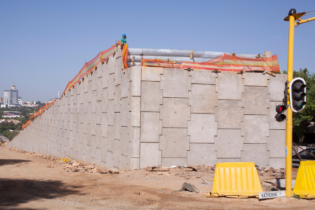Two of South Africa’s big-four banks say while they welcome the introduction of alternative building technologies in the residential sector, they are not yet ready to finance container housing.
Earlier this week, Citiq Group unveiled a controversial housing development in Windsor East largely comprising discarded shipping containers. Head of affordable housing for Nedbank home loans, Jeff Lawrence, says the bank has not approved containers for end user finance and would require all the technical details to consider any such request. “Until these details are submitted, we are not in a position to make any further comment.” Head of home loans at Standard Bank South Africa, Steven Barker, says the institution fully supports the exploration of alternative technologies, particularly those that are environmentally friendly, sustainable and affordable. Barker said the bank had in the past approved some unconventional building methods based on its lending criteria appetite coupled with the usual regulatory building requirements within the country. “While we have not been approached to review or approve this particular alternative building proposal, we would do so in line with the above,” Barker said. FNB, who has also supported alternative housing structures in Cosmo City north of Johannesburg, says it also backs manufacturers and developers using new products or innovative and unconventional building systems. However, it must be formally introduced to the market through Agrement certification. This could be a relatively long process. Absa, however, says it doesn’t have a problem with container housing in principle. The bank’s head of retail markets Arrie Rautenbach says: “Absa Home Loans would in principle consider the provision of end user finance to customers interested in this form of new alternative housing. This however would be subject to our normal lending criteria for mortgage finance, as well as the alternate construction technology’s ability to meet Absa’s criteria and policies on rational designs. “Our rational design policy would assess the alternative technology in terms of key issues such as its compliance with all structural engineering and architectural design considerations, key approvals from institutions such as NHBRC (National Home Builder Registration Council) and National Building Regulations, as well as its ability to meet the requisite social or target market acceptance levels, amongst key considerations.”According to Agremént South Africa’s website, it is an internationally recognised and objective “centre for the assessment and certification of innovative non-standardised construction products, systems, materials, components and processes, which are not fully covered by a South African Bureau of Standard (SABS) standard or code of practice.”
Certification from this centre is recognised by the national building regulations. Head of FNB property valuations, Deon Swart, says the container housing method of construction falls outside of the scope of existing SABS standards. Its fitness as an alternative building technique will need to be tested through the Agremént certification process. Swart says from a credit and risk point of view when dealing with asset based finance, the bank will need proof of market demand in the primary and secondary markets. Such proof can only be measured in terms of a full and independent social impact study of the product. The bank will also require written proof of the following:– The cost benefit of the alternative building method measured against that of bricks and mortar;
– That all unconventional buildings systems will be constructed under the supervision of a professional structural engineer; and
 – That all alternative structures will be covered by comprehensive homeowners insurance by all the major companies in South Africa.
Source: moneyweb
– That all alternative structures will be covered by comprehensive homeowners insurance by all the major companies in South Africa.
Source: moneyweb







